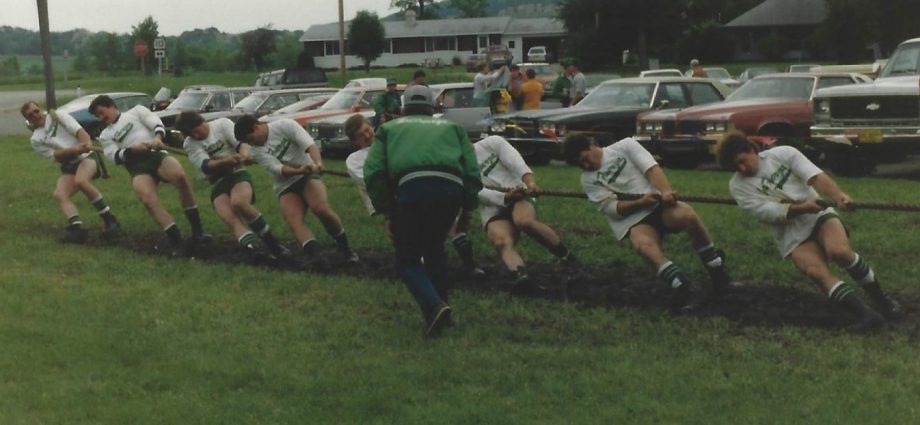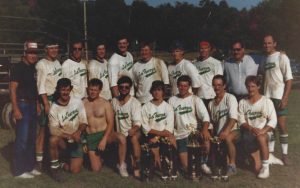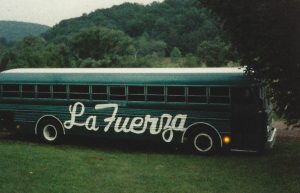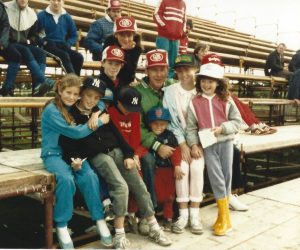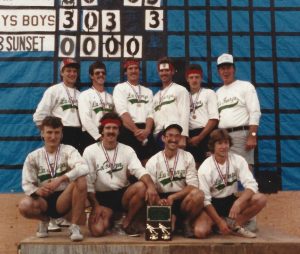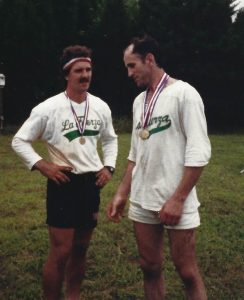Celebrating a win in Wisconsin are LaFuerza team members (front row, from left) Mike Epler, Bryce Bedford, Mark King, Ed Crawford, Duane Bailey, Ron Cook, Jim Stanton, (back row) coach Dave Moon, Bob Dibble, Jerry Kipp, Randy Epler, Jerry McMahon, Pere Soloway, Todd Werts, Herb Warren, Dan Cookes, and coach Sean Kilbride.
By Rick Hiduk
(originally published in Living Bradford County magazine)
An often forgotten snippet of New Albany’s history came to light again recently when two members of a champion tug of war team sat down with their former sponsor and coach to recall their rise to national acclaim. Mike Epler and Doug Duffield descended on the longtime home of Dave and Mary Moon in Evergreen to reminisce about a decade during which they beat the odds of a band of hardy country boys out-pulling other national champions to take their team to international competition in Europe.
“You have no idea what it takes to put a team on the road that could compete at an international level. It was a very lengthy process,” Dave began.
The story begins in about 1980 when Dave sponsored a tug of war team for New Albany’s annual Old Home Day celebration. They lost two years in a row, but Dave didn’t give up. He decided the team needed more muscle. As a sports writer for the Rocket-Courier newspaper in Wyalusing, Dave was familiar with the top athletes who had graduated from Wyalusing Valley High School and reached out to a number of former wrestlers and asked them if they wanted to be part of a pulling team. They called themselves LaFuerza, a name suggested by Dave’s daughter Valerie. They won in New Albany two years in a row and, feeling more confident, the members of LaFuerza decided to attend some other pulling events on the East Coast, including at the Sullivan County Fair in Forksville and a big event in Vermont, where they also won.
The core of the eight-member team remained fairly consistent, with team captain Mike Epler and his brother, Randy, remembered as its key players. “Mike had the perfect physical build for tug of war. He’s got a decent upper body, but he’s got a hell of a set of legs on him,” Dave remarked. “He and his brother were built for pulling.” Mike initially had a team of his owned that he merged with Dave’s.
Other core members that pulled with the team for two or more years included Ron Cook, Jimmy Stanton, Kyle Robinson, Duane Bailey, Bob Dibble, Jerry Kipp, Kevin Wertman, Gary Otis, Todd Werts, Ed Crawford, Cy Sanders, Mark King, Jerry McMahon, Pete Solowiej, Bryce Bedford, Doug Duffield, and Jim Campbell. Most were from the New Albany area, and others hailed from Wyalusing and Towanda.
“There are so many names to mention. The eight of us could never have made it without them,” Mike Epler stated. “We were a brotherhood. There was nobody that I didn’t like and respect on that team.”
“We never turned anybody down,” Dave said of dozens of local men who tried out for LaFuerza over the years. “Some had the ability, but they didn’t keep going.” Dave explained that the commitment to regular practicing and travel was too much for some who were also wanted at home.
“We spent more time with each other than our family when we were pulling,” Doug Duffield recalled. He was on the team for six years. “Families made a lot of sacrifices too.”
In the meantime, LaFuerza was making inroads in a sport that can vary from region to region and, as they would eventually learn, from continent to continent.
“We were getting pretty good and winning wherever we could get into a pull,” Dave recalled. One day, he came across a photo of an international pulling contest and was intrigued. In the days before Google and the internet, he managed to track down the president of the United States Amateur Tug-of-War Association (USATOWA), who invited the young men to pulling contests in states like Illinois, Wisconsin and Minnesota.
With a record of 77 wins and 3 losses, LaFuerza hit the road in 1984. They found the Association to be very well organized but the midwest teams a bit intimidating. “We won our first three pulls against lesser teams and then lost 26 in a row,” Dave recalled.
They couldn’t help but admire a repeating national championship team called Rudy’s Boys. Though Dave thought his guys had as much strength, he sensed that they were missing something and sought guidance upon their return home from Irish pulling coach Sean Kilbride. “He taught us the art and science of tug of war,” said Dave. Sean actually resided with the Epler family during this time and compared the rolling countryside of Albany Township to that of Ireland. Dan Cookes also helped with coaching duties.
Practices were grueling and ran every other day from January to the fall. A heated building was constructed on the Moon property so the men could practice close to home. Their “competition” was tractor weights that they moved via a series of pullies. After practice, the men would go to Epler’s Lumber Yard and construct trusses, which they sold to pay for their trips. Their bus was outfitted with sleeping bunks and emblazoned with the La Fuerza logo. They went back to Wisconsin the following year and started beating other U.S. teams.
Things really began to pick up for LaFuerza in the spring of 1987 when they twice defeated Rudy’s Boys at a competition in Lodi, WI, with their 720 kilo team. They picked up wins in other weight classes as well, including a bout with a team from Cedar Rapids that was ranked fifth in the world. Dave said that no team outside the midwest had ever won the national meets. They were finally ready to take on the world, literally traveling to Ireland later that month for the Open European Championships.
Tug of war is entrenched in the heritage of many cultures but maybe nowhere as deeply as in Europe and especially Ireland. The way the Tug of War International Foundation is structured, multiple teams from across Ireland are eligible for international competition. From the time they arrived, the country boys from Pennsylvania watched successive matches on a playing field full of rotating squads in front of thousands of spectators.
“We watched those teams pull and were starting to learn the intricacies of how to win,” Dave related.
“We would film all of the pulls and then watch them in the hotel at night. Then, Mike and Randy and I would make changes.” They did well, pulling into second- and third-place ties against teams from Ireland, England, Sweden and the Netherlands. They caught the attention of judges there who referred to LaFuerza as “one of the toughest teams the United States has ever sent over.” The next year they competed internationally in Sweden and, in 1990, in Holland, where they finished in seventh place.
At each of the three consecutive European meets they attended as national champions, they were received warmly by the local people who didn’t see them as country boys but as Americans, proudly sporting their USA jackets. Children would approach them and asked if they had anything “American” to give them. They started with the spare change out of their pockets but later took caps from a local business to hand out.
For all of the dreams that came true for LaFuerza, becoming Olympians was not one of them. The sport had been part of the Olympics from 1900 to 1920, and there was talk of putting it back into the program, but it never happened. It has, however, been part of the World Games since 1981. LaFuerza continued to pull through the ’90s, one of their last big events being the World Championships held in Rochester, Minnesota in 1998.
From the start, Dave told the men, “Don’t say we can’t until you’ve tried it.” He modestly gives the team members the majority of the credit for their success. “It wasn’t anything that just happened. They determined that it was going to happen. And, for these boys, it was quite a rewarding experience.” Nonetheless, Dave refers to those decades as the best time of his life. Mostly, he wants those glory days to be remembered as an important chapter in local history.
“Dave was like a big brother to all of us and dedicated a lot of time to the team and the sport,” said Doug. “He could calm us down and read the other team and let us know when we should go on the attack. And he was a great ambassador for us when we were in international competition.”
“It all came about with Dave. He was the mastermind behind it,” Mike concurred. “After the time we had help from Sean Kilbride and Dan Cookes, Dave was our coach. As pullers, we remain grateful to him to this day.”
Mike would like to bring together the many team members of LaFuerza for a reunion and encourages any former team members or people with information about them to contact him via email at mike.epler27@gmail.com.
LaFuerza coach Dan Moon making friends with Irish children at a European championship.
Team members at the podium in Boston celebrating a national win.
LaFuerza coach Sean Kilbride (right) and team captain Mike Epler.
